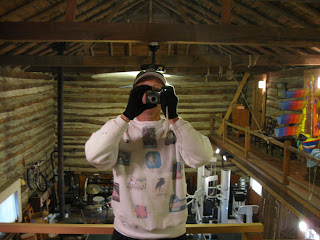I sometimes find myself musing about the goals we set for ourselves, those silly little objectives we dangle in front of our minds. Actually, they remind me of the treats our dogs expect whenever they come indoors. That is, when you scratch all the way down to the root of these motivational tricks, you find potty training.
I remember, back before I left my daily immersion in the occasionally exciting but typically mundane business world, I was force-fed some hogwash about goals and objectives being two very different concepts, kind of like the “H” at the end of the football field being a “goal” and each ten-yard line being an objective. Maybe a bit of precision is called for here.
Let’s say my goal is to maintain a superior level of fitness so as to extend my stay here on Earth as long as possible, unless a giant SUV or some illness or terrorist intervenes. Toward that end, I realize I’m averaging nearly forty miles of running per week so I decide to keep it up through December. Then, because I need to feel special the week of my birthday, I decide to try to squeeze in a mile for each year. I might also throw in weekly track workouts, to get my fast-twitch muscle fibers in shape. And I choose a few races to look forward to, selecting three target times for each event – one I might be able to attain if everything falls into place just right, a second time I’d be pretty happy with, and a minimum time that would upset me if it weren’t exceeded. I now have a list of objectives....
Being logical for a minute, I realize I should revise my goal. Something tells me my objectives are out of whack. I think I read somewhere, or maybe it was my mother who told me, you can overdo it. Yes, I could revise my objectives. On the other hand, I’ve got to face the truth. Running feels good. I kind of like those objectives – short-sighted, potty-trained me. I want to lope up the mountainside, listen for wildlife, watch for movement far below, and inhale a fantastically varied bouquet of fragrances. I could walk, but walking would fill up half a day getting me where I’d like to be. I also enjoy showing up at the track once in a while and running faster than most people my age can run. Let’s see. Could I change my goal to fit my objectives? Maybe: To feel good until I die, or at least as long as possible.
I guess I really don’t need a goal, just a few objectives I can change and rotate whenever I want some variety. But it doesn’t feel right. I really ought to be able to outgrow the potty-training principles. If I were a truly good person, I would work through this exercise and come up with an admirable goal, to go along with the other goals every good person sets, such as “becoming a man of integrity” or “making a difference in the world.” I might change my life and combine a gentle running schedule with cross-training (maybe swimming or biking and weight training), daily meditation, no red meat, six small meals per day, and abstinence of several sorts. Wait, do I really have to wean myself of all this running?
Nah, I’m going to abandon this project, which may be why I used the technical term “hogwash” earlier in this example of the wisdom I’ve gained since the time it was legal for me to buy beer but I couldn’t vote. I like my little objectives. And, by the way, now I remember it wasn’t something I read or something my mother said, but the fact that almost everyone I know who no longer runs, but used to, thinks I’m nuts. They insist I’m gradually tearing my knees apart so some day in the not-too-distant future I’ll feel bad, very bad.
Now that I've read "Born to Run," I don’t exactly “laugh in the face of danger” (The Lion King), but I don't believe them. My knees and my back don't hurt. Knock on wood. "Born to Run" quotes Jack Kirk, a famous runner who raced passed age 95 and died 3 months after turning 100: "You don't stop running because you get old. You get old because you stop running."
"I like that quote," says Virginia, "not because it's true, although it may be, but because of the refreshing attitude it expresses."
Potty training can get old, but it doesn't have to.
Public Art And The Magic Eight Ball
1 day ago

































